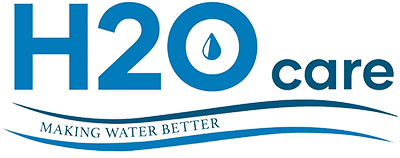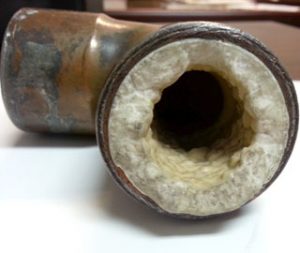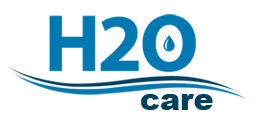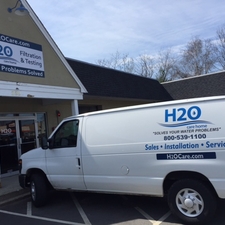The following discusses potential water quality issues or concerns as well as water filtration options for residents of Ipswich, MA on either public or private water supplies.
WHERE DOES YOUR IPSWICH WATER COME FROM?
The Town of Ipswich Water Treatment Plant draws water from Dow Reservoir and Bull Brook Reservoir, both located in the Parker River Watershed. The Town also draws water from five groundwater sources to augment this supply: Mile Lane and Browns Wells (Parker River Watershed) and Essex Road, Fellows Road, and Winthrop Estate Wells (Ipswich River Watershed). The Town makes every effort to monitor pumping and minimize withdrawals from the wells in the Ipswich River Watershed because of its fragile ecosystem. For a link to the latest Annual Water Quality Report as of this writing, go to Annual Water Quality Reports Archived.
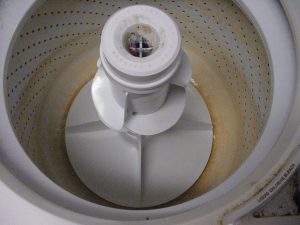
Dissolved Iron Staining
BAD ODORS & TASTES IN YOUR WATER
There are various types of bad odors and tastes that you may experience in your water. Hydrogen Sulfide is not uncommon and is evidenced typically by a rotten egg smell in your water, however this may also be caused by high Manganese levels as well. A water filtration specifically for this problem is effective in correcting this. For a more complete description of this and other potential bad odors and taste in your water, see the link at https://bad-odor-taste-water/.
You may notice odor and taste issues if your home is supplied by town water, typically associated with Chlorine. Chlorine is used for disinfection purposes by the town to control microorganisms including bacteria and others that may be present in the water distribution system. Carbon water filtration systems are effective at removing chlorine and the associated taste and odors that come with it. These systems can either be installed at the point of entry in your home, typically in the basement, or at a point of use for drinking water only.
WATER FILTRATION SYSTEMS & WATER SOFTENERS
Water filtration systems can be installed for the removal of any of the potential causes of symptoms you may be experiencing. Water softeners are typically installed to remove hard water minerals (magnesium and calcium), dissolved IRON or MANGANESE in the water through a technology called Ion Exchange. For high levels of Manganese or Iron, an upflow, high efficiency water softener is the most effective solution.
There are different water softener designs and capacities and, depending on your specific water chemistry and volume usage, a properly designed system will work well. To remove particulate iron or manganese, a properly sized sediment filter is required. Hydrogen Sulfide is evidenced typically by a rotten egg smell in your water, however this may also be caused by high Manganese levels in the water as well. A water filtration specifically for this problem is effective in correcting this. Chlorine can be removed with a carbon filtration system to remove bad taste and odor.
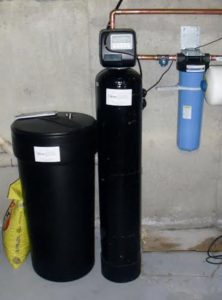
Water Softener & Big Blue Sediment Filtration
Any water filtration system or water softener recommendation should start with a water test before an informed decision can be made. This is important not only to figure out what needs to be removed from the water, but also to properly size the water softener or water filter. To determine what type of water testing to have performed and how to take a proper sample, call a water treatment professional or a state certified laboratory.
H2O Care is an established, full service water filtration and testing organization, originally formed in 1989, based in Middleton, MA off route 114 with an additional office in Stow, MA. See our published articles in Water Technology Magazines at http://h2ocare./pub. Contact us at service@h2ocare.com or 978-777-8330.
